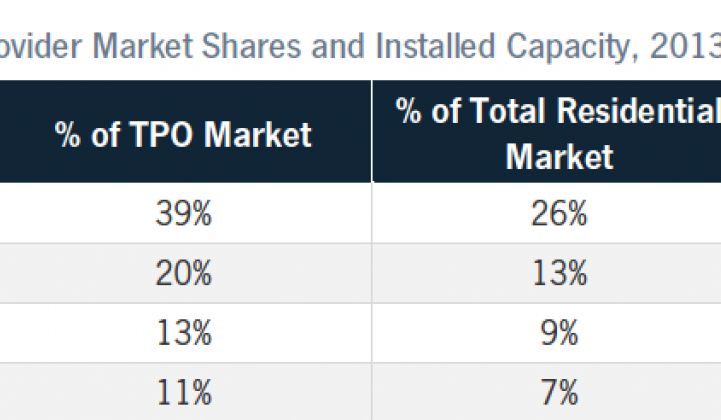Most greentech companies see governments as helpful, rich big brothers. SunRun sees them as scary competitors.
Launched in 2007, SunRun came up with a way to provide financing to consumers who couldn't otherwise afford to plunk down more than $20,000 for a system. The San Francisco company, which focuses on the residential market, has since expanded to Massachusetts and Arizona and signed financing contracts with more than 1,000 customers.
But the company is facing a new breed of competitors, and they are not other startups looking to replicate SunRun's strategy. Instead, they are cities and counties who are selling bonds and amending their real estate tax codes to help their residents go solar. Berkeley is a pioneer in this area (see Berkeley to Launch Solar Financing Program).
The growing competition from cities and even counties is a key reason SunRun decided to raise $18 million in a second round of financing, said Lynn Jurich, president of SunRun, during an interview Monday. Accel Partners, which lead the second round, will also potentially help SunRun better capitalize on social networking, Jurich said. Accel's most high-profiled investment in that arena is Facebook (SunRun advertises on Facebook).
Accel's "knowledge on social networking sites will help us get the word out," Jurich said. "We are the more efficient way of deploying solar."
Foundation Capital, who invested in a previous, $12 million round announced in June last year, also invested in the second round.
Affordability has always been a major hurdle for average consumers to embrace solar. If they want to buy a 3-kilowatt system out right, they could spend on average around $23,000 (based on California Solar Initiative's data of the residential systems sold over the past month, according to SunRun). The cost would go down by roughly 44 percent in California thanks to the state's solar rebate and the 30 percent federal tax investment tax credit.
Still, the incentives doesn't make owning solar power systems as affordable as, say, a TV. A 3-kilowatt solar system in San Francisco, including all of the rebates, still costs around $13,000 and payoff takes eight years or more.
SunRun avoids the high capital costs by not having consumers buy their solar systems. Instead, consumer pay as low as $1,000 up front to help foot the cost of putting solar panels on their rooftops. After that, they send SunRun a monthly payment based on a fixed rate that lasts through an 18-year contract. This type of power purchase agreements are available to customers in Massachusetts and California (except Los Angeles).
In Arizona and in Los Angeles, SunRun offers a leasing plan for regulatory reasons. Customers who opt for the lease would pay a monthly fee that is not based on the amount of power generated by their systems, and they may not get the full maintenance and repair services that would come with a power purchase agreement.
"I came from the consumer market myself, and a lot of service business is about making it simple, turnkey and easy for consumers," said Rich Wong of Accel. Wong, who began his career as a brand manager at Procter & Gamble, will serve on SunRun's board of directors. "SunRun is a clear leader in that space."
Last November, SunRun said it had received a commitment from the U.S. Bank to provide up to $105 million to finance installations and services to SunRun's customers. This pot of money serves a different purpose than the $18 million that SunRun just raised for corporate expenses such as business development. Nine installers have signed up for SunRun's services, including Akeena Solar, groSolar and Alteris Renewables.
SunRun isn't alone in providing financing to consumers. SolarCity, based in Foster City, Calif., also has a leasing program. SolarCity also is an installer, however, and serves both the residential and commercial markets.
But the biggest competitors are turning out to be cities and counties that are creating a special tax district to finance installations for their residents.
Berkeley, which launched its pilot project at the end of last year, sold bonds to finance the upfront installation costs. Residents repay the city (with interest) via their property tax bills – a line is added to the bills and only those who signed up and installed solar would have to pay.
Sonoma County, meanwhile, is using its general fund to finance installations of solar and other renewable energy and energy efficiency projects for its residents. The county started the program in spring this year, and it would get the paybacks via property tax payments.
Jurich said SunRun could offer better services to consumers than local governments could. SunRun offers competitive interest rates, and it provides monitoring and repair service, which is crucial for ensuring that a solar energy system works as promise over a typical lifespan of 20 years.
Consumers usually don't have the time or inclination to regularly monitor their systems' performance, even though their systems come with software for web-based monitoring.
Some of them have been surprised to find that they didn't save much in electricity costs because they didn't realize their systems weren't working properly (see Having Solar Energy System Trouble? Don't Call Your Utilities).
SunRun plans to spruce up its website to attract more consumers, Jurich said. She also hopes to partner with local governments.
The company is looking at expanding its business to other states, most likely in the East Coast, but Jurich declined to say more.



